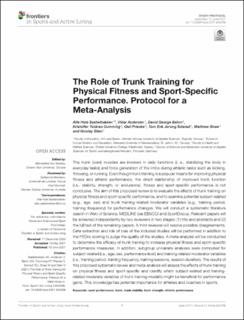| dc.contributor.author | Sæterbakken, Atle Hole | |
| dc.contributor.author | Andersen, Vidar | |
| dc.contributor.author | Behm, David G | |
| dc.contributor.author | Cumming, Kristoffer Toldnes | |
| dc.contributor.author | Prieske, Olaf | |
| dc.contributor.author | Solstad, Tom Erik Jorung | |
| dc.contributor.author | Shaw, Matthew Peter | |
| dc.contributor.author | Stien, Nicolay | |
| dc.date.accessioned | 2022-03-14T12:44:57Z | |
| dc.date.available | 2022-03-14T12:44:57Z | |
| dc.date.created | 2021-12-17T08:59:21Z | |
| dc.date.issued | 2021 | |
| dc.identifier.citation | Sæterbakken, A. H., Andersen, V., Behm, D. G., Cumming, K. T., Prieske, O., Solstad, T. E. J., Shaw, M., & Stien, N. (2021). The role of trunk training for physical fitness and sport-specific performance. Protocol for a meta-analysis. Frontiers in Sports and Active Living, 3. | en_US |
| dc.identifier.issn | 2624-9367 | |
| dc.identifier.uri | https://hdl.handle.net/11250/2985079 | |
| dc.description.abstract | The trunk (core) muscles are involved in daily functions (i. e., stabilizing the body in everyday tasks) and force generation of the limbs during athletic tasks such as kicking, throwing, or running. Even though trunk training is a popular means for improving physical fitness and athletic performance, the direct relationship of improved trunk function (i.e., stability, strength, or endurance), fitness and sport-specific performance is not conclusive. The aim of this proposed review is to evaluate the effects of trunk training on physical fitness and sport-specific performance, and to examine potential subject-related (e.g., age, sex) and trunk training-related moderator variables (e.g., training period, training frequency) for performance changes. We will conduct a systematic literature search in Web of Science, MEDLINE (via EBSCO) and SportDiscus. Relevant papers will be screened independently by two reviewers in two stages: (1) title and abstracts and (2) the full text of the remaining papers. A third reviewer will resolve possible disagreements. Data extraction and risk of bias of the included studies will be performed in addition to the PEDro scoring to judge the quality of the studies. A meta-analysis will be conducted to determine the efficacy of trunk training to increase physical fitness and sport-specific performance measures. In addition, subgroup univariate analyses were computed for subject-related (i.e., age, sex, performance level) and training-related moderator variables (i.e., training period, training frequency, training sessions, session duration). The results of this proposed systematic review and meta-analysis will assess the effects of trunk training on physical fitness and sport-specific and identify which subject-related and training-related moderate variables of trunk training modality might be beneficial for performance gains. This knowledge has potential importance for athletes and coaches in sports. | en_US |
| dc.language.iso | eng | en_US |
| dc.publisher | Frontiers Media S.A. | en_US |
| dc.rights | Navngivelse 4.0 Internasjonal | * |
| dc.rights.uri | http://creativecommons.org/licenses/by/4.0/deed.no | * |
| dc.subject | sport performance | en_US |
| dc.subject | trunk | en_US |
| dc.subject | trunk stability | en_US |
| dc.subject | trunk strength | en_US |
| dc.subject | athletic performance | en_US |
| dc.title | The role of trunk training for physical fitness and sport-specific performance | en_US |
| dc.type | Peer reviewed | en_US |
| dc.type | Journal article | en_US |
| dc.description.version | publishedVersion | en_US |
| dc.rights.holder | © 2021 Saeterbakken, Andersen, Behm, Cumming, Prieske, Solstad, Shaw and Stien | en_US |
| dc.subject.nsi | VDP::Medisinske Fag: 700::Idrettsmedisinske fag: 850::Treningslære: 851 | en_US |
| dc.source.volume | 3 | en_US |
| dc.source.journal | Frontiers in Sports and Active Living | en_US |
| dc.identifier.doi | 10.3389/fspor.2021.625098 | |
| dc.identifier.cristin | 1969711 | |
| cristin.ispublished | true | |
| cristin.fulltext | original | |
| cristin.qualitycode | 1 | |

